Have you ever noticed how the quiet of the late-night hours transforms your computer into a seemingly magical gateway of endless code? As someone who often finds themselves immersed in programming while the rest of the world sleeps, I can personally relate to that unique blend of peace and productivity.
There’s an unspoken camaraderie among us night owls—a common understanding that something about those twilight times unleashes our coding potential like no other.
In this post, we’re going to dive deep into that phenomenon and shed some light on why tapping away at our keyboards in the stillness of the night feels almost like a superpower bestowed upon us by the moon itself.
So sit back, pour yourself another cup of coffee (or tea!), and let’s explore these nocturnal nuances together—because if you’re reading this now, chances are we’re already kindred spirits in harnessing this midnight energy for our craft.
Key Takeaways
Developers like to code at night because it’s quieter and there are fewer interruptions, which helps them focus better on their work.
Coding at night can mess with sleep patterns due to the bright screens and being active when the body expects rest.
Some programmers’ brains are more awake at night, making it easier for them to solve complex problems during these hours.
Programmers often enter a state of ‘flow’ more easily at night, where they can work deeply without noticing time passing.
Having a routine, managing distractions, and taking care of health is important for developers who prefer working late into the night.
Table of Contents
The Phenomenon: Why Developers Code at Night
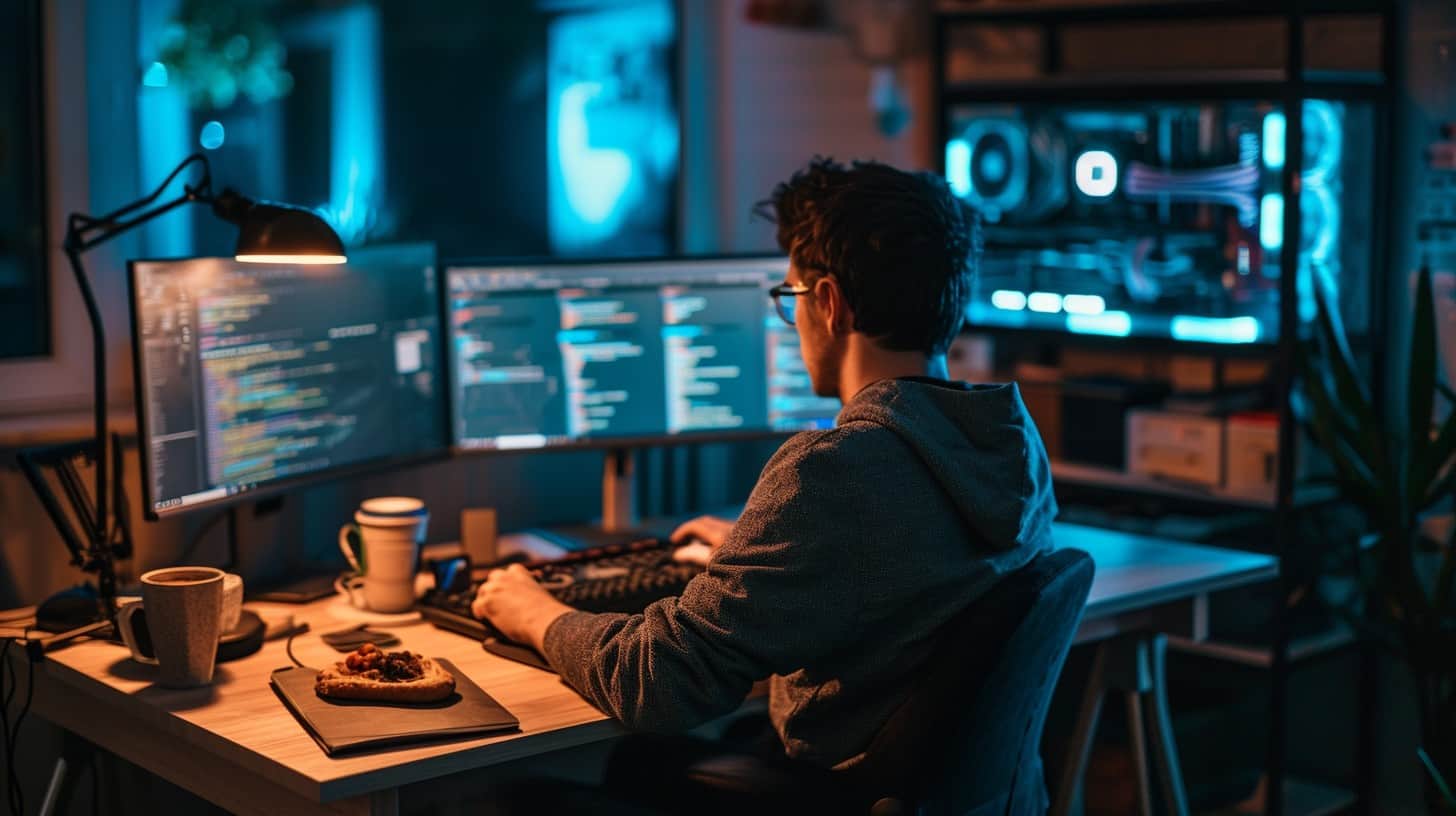
So, we’ve set the scene, and now it’s time to dive into the heart of this nighttime coding mystery. Picture this: Outside, everything is quiet. Most people are sleeping, but not us developers.
We’re just getting started. There’s something magical about the stillness of the night that gets our minds buzzing with ideas.
You see, at night there are fewer phone calls, less social media noise and pretty much no meetings to run off to – it’s just me and my code. No interruptions mean I can get ‘in the zone’ way easier.
And let’s be honest, blasting my favorite tunes without worrying about bothering anyone else is a sweet bonus! Night is when I feel most alive and creative; it’s like my thoughts have free rein to dance around in my head without bumping into daytime distractions.
The Maker’s Schedule: A Developer’s Time Management
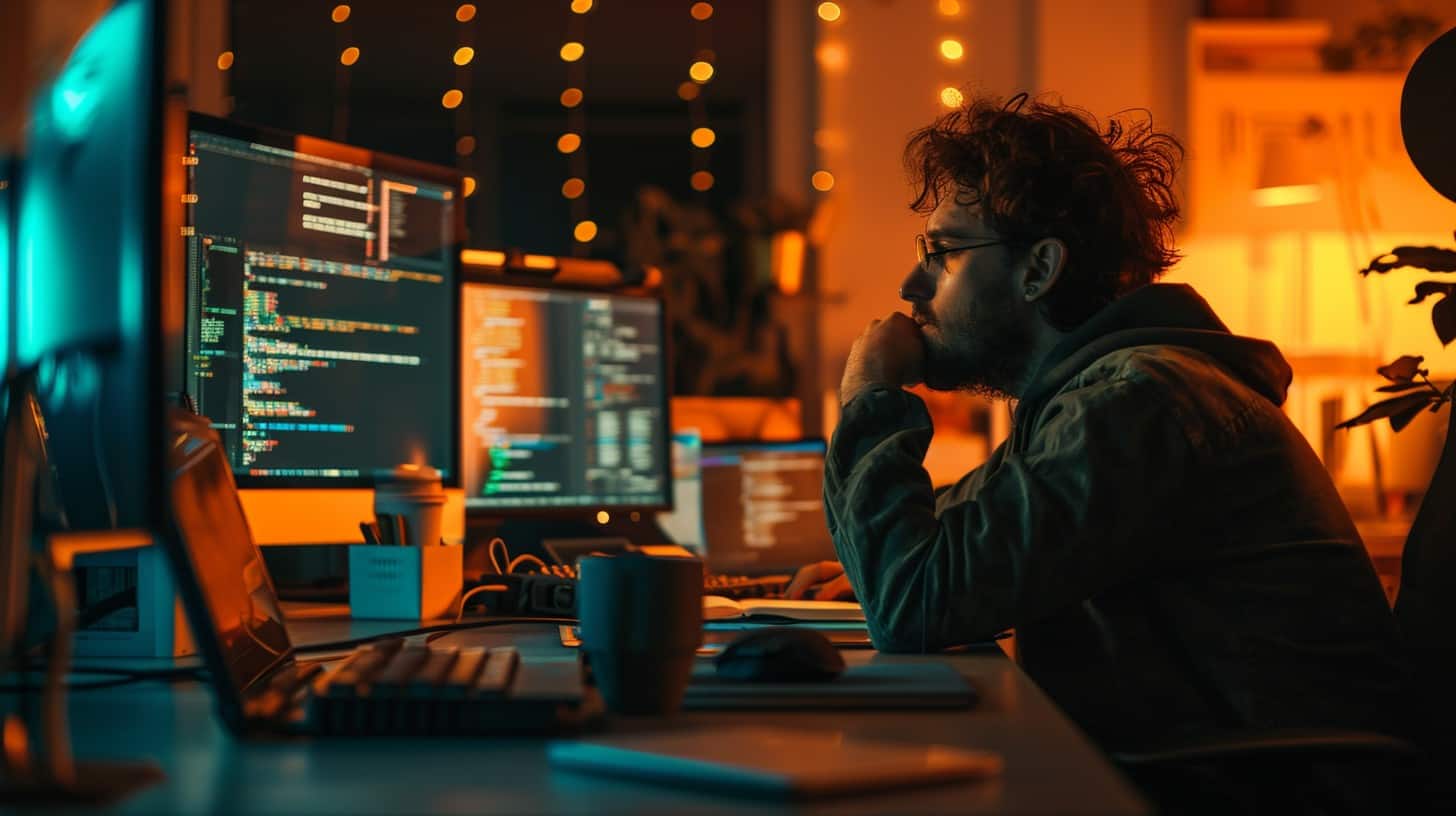
Let’s talk about the maker’s schedule. It really is different from what most folks do at work. You see, I need big chunks of time to dive deep into coding. Meetings? They just chop up my day and mess with my flow.
That’s why a lot of us prefer night hours — no one pings you to chat or asks for quick favors when they’re asleep!
We love those late, quiet times because our brains can focus on tough problems without distractions. Coding isn’t like flipping burgers; it needs serious brainpower and peace to really get it right.
Think about your own work… wouldn’t you want long hours without breaks if it meant doing something amazing? That’s what we aim for every night when everyone else is off dreaming!
The Sleepy Brain: The Science Behind Night Owls
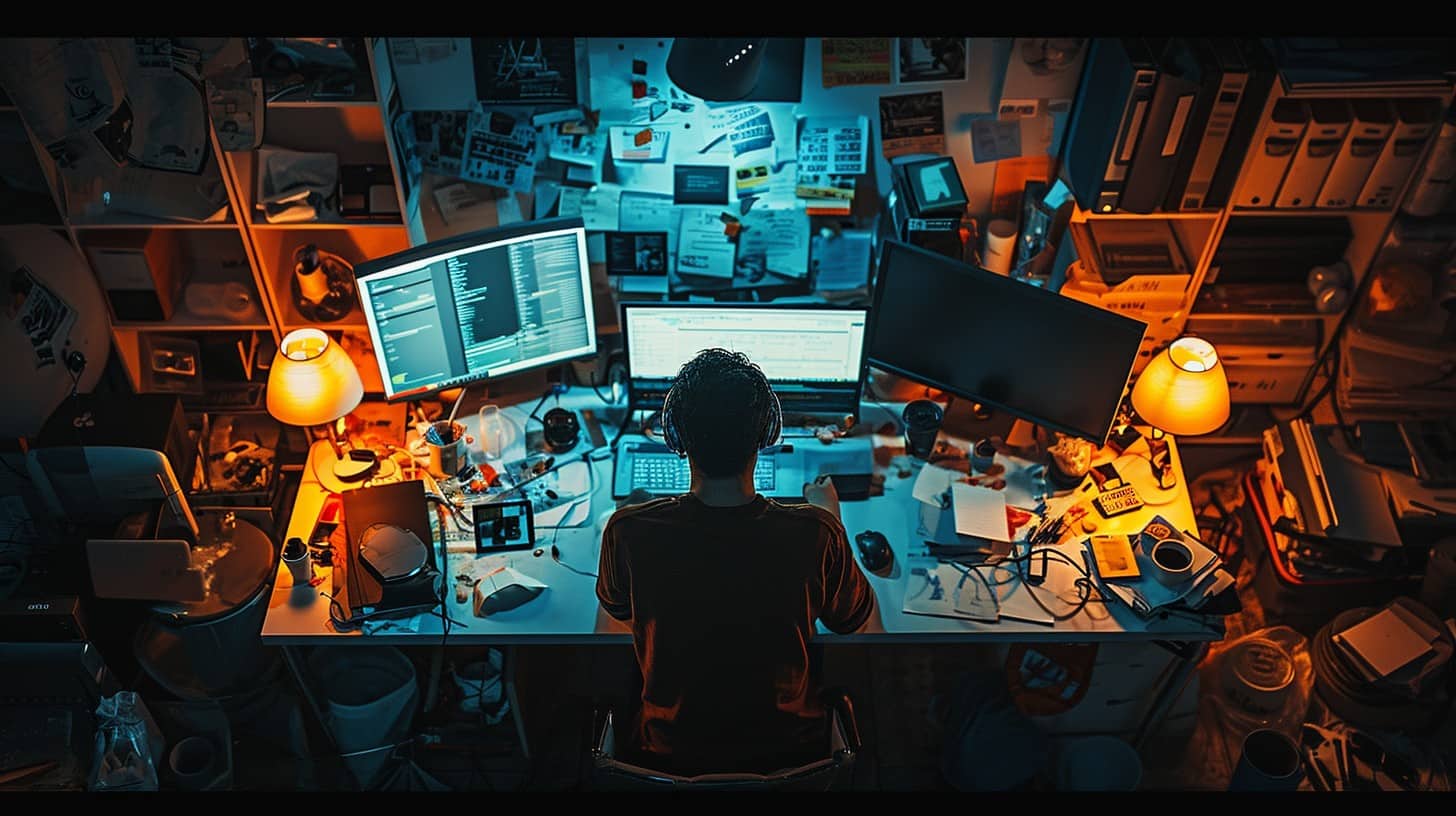
So, we’ve talked about managing time and why long stretches of it rocks for diving deep into coding. Now, let’s peek into the night owl’s mind. Science says some of us are wired to be more awake when the sun goes down.
We call this our circadian rhythm – kind of like an internal clock that tells us when to feel sleepy or perky.
Think about it; being up late has its perks for coding wizards like us. Our tired brains might actually get better at zoning in on complex problems without getting distracted by random thoughts.
A sleepy mind filters out the noise and locks onto the task – pretty neat, huh? Plus, who doesn’t love that peaceful feeling when everyone else is asleep, and you have your own world where you can create magic with code?
Here’s another awesome bit: our body clocks aren’t just set to wake-sleep patterns but also influence how our brains work during those times. Some folks get their best brainwaves going when most people are catching Zs.
It’s all about that unique rhythm each one of us dances to- finding your groove could mean embracing those quiet night hours to tap into a wellspring of creativity!
The Effect of Bright Computer Screens on Developers
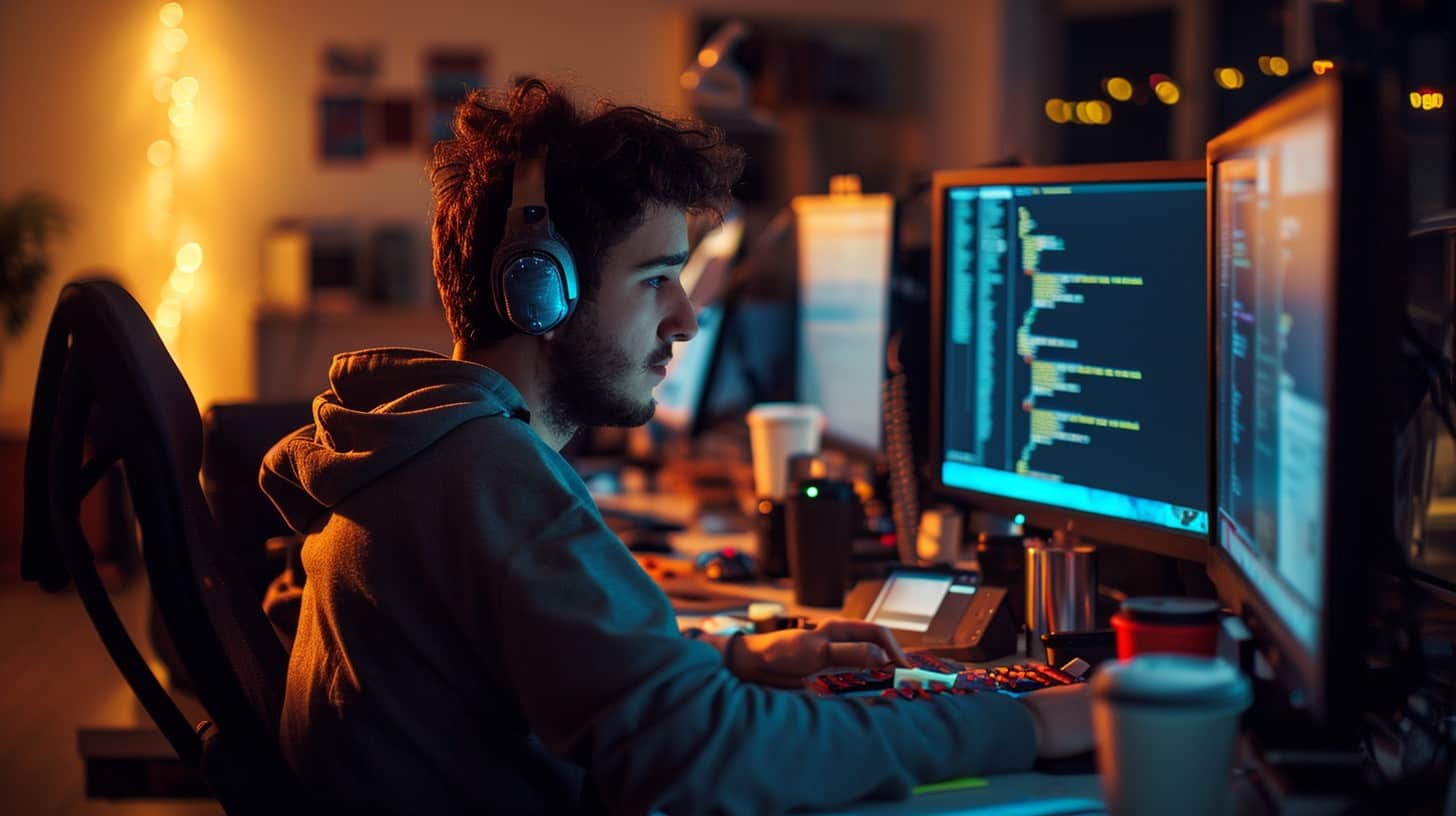
Bright screens are a big deal for us coders, especially at night. They throw off our sleep cycle because the light tricks our brains into thinking it’s still daytime. Ever find yourself super awake after a long coding session late in the evening? That’s because of the blue light from the screen telling your body to stay alert when you should be winding down.
This can lead to a messed-up sleep schedule where we end up sleeping way less than we should. And let’s not forget, getting too little sleep is like kryptonite for programmers; it messes with memory and concentration.
So yeah, those late-night coding stints might seem productive at first, but can actually make things harder in the long run if we’re running on empty.
The Culture of Night Coding
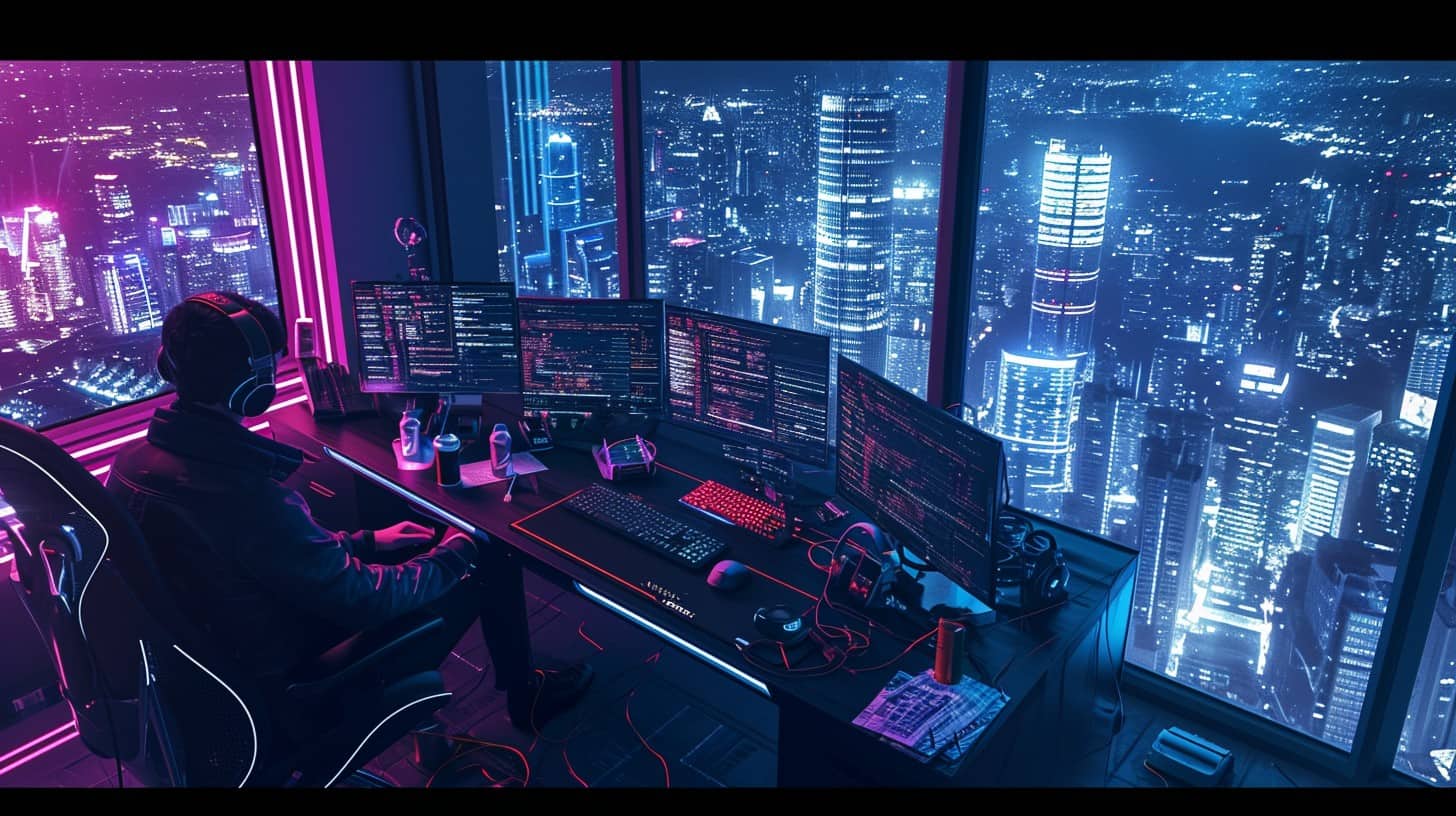
There’s something about the quiet of the night that just clicks with coding. It’s like the world goes to sleep, but my brain gets this hyperactive jolt—sort of a silent rush. No pings from coworkers or clatter from the living room.
Just me and my glowing code on the screen, tapping away in peace.
I’ve heard some call it a culture among us programmers, this pull towards moonlit keyboards and caffeine-fueled sessions. Maybe it’s because we love those geeky hobbies that come alive after dark, or maybe our brains just sync up with the stars above for that groovy problem-solving vibe.
Next thing I’m going to chat about is flow in programming, which is kind of perfect timing – since getting into flow seems even easier when everything else winds down.
Understanding Flow in Programming

Ever found yourself lost in a sea of code, where hours feel like minutes and the world just fades away? That’s because we programmers stumble upon this magical state called ‘flow’—and let me tell you, it’s way easier to hit that sweet spot when the moon is high and distractions are low; stick around if you’re curious why nighttime might just be our secret sauce for peak coding wizardry.
Defining Flow
Hey, let me tell you about flow. It’s like being in the zone, you know? When I’m coding and everything just clicks, that’s flow. My mind is clear, my fingers fly across the keyboard, and I don’t even notice time passing because I’m totally absorbed in what I’m doing.
It’s like a superpower for programmers.
Picture this: You’re working on a tough problem and boom—suddenly you’re laser-focused and all the chatter in your head goes quiet. That feeling right there? That’s what we call flow.
It’s crucial for us coders to find this state because it lets us crank out work without getting tripped up by little things. Plus, when we’re flowing, interruptions are our worst enemy—they can knock us straight out of our groove.
The Autotelic Personality and Flow
So, there’s this thing called the autotelic personality that a lot of us programmers seem to have. It means we really get into our work and hit a sweet spot – call it “flow“. Flow is when you’re super focused and having fun while coding.
You love what you’re doing so much that time flies, and you don’t notice much else around you.
Now let me tell y’all, getting into flow isn’t always easy, but for some reason, it feels easier at night. Maybe fewer distractions? Quieter environment? Whatever the reason, once we hit flow, interruptions are like kryptonite – they can totally throw us off our game.
Oh! And those personal projects we tinker with after dark? They often make us way more productive than usual because our hearts are all in.
Next up: Achieving Flow: Is it Easier at Night? Let’s dive in and see if those late hours really do the trick for catching that elusive wave of concentration.
Achieving Flow: Is it Easier at Night?
I love the feeling of getting into flow while coding. You know, that zone where the world fades away, and it’s just you and your code dancing to an awesome rhythm. It’s like everything clicks into place and hours fly by without even noticing.
Nighttime can be pure magic for hitting this sweet spot.
Honestly, distractions during the day are a real buzzkill when you’re trying to groove with your work. But come evening? It’s just me, my thoughts, and my glowing screen. No interruptions from colleagues or random phone calls—just peace and quiet (and maybe some good tunes).
That calm lets me focus hard on solving problems and often leads to my best ideas popping up out of nowhere!
Day-time vs. Night-Time Flow
Alright, let’s talk about this whole day versus night coding flow that seems to have us programmers in a bit of a divide. You’ve probably noticed how some folks swear by the wee hours of the morning, while others can’t seem to function past dusk. Here’s the deal…
| Day-time Flow | Night-Time Flow |
|---|---|
| Interruptions are more frequent. That pesky sun’s up, and so is everyone else. | The world’s quiet. It’s just you and your code, with minimal disruptions. |
| Meetings, calls, the hustle and bustle—distractions galore. | No one’s scheduling a meeting at midnight—peace reigns. |
| Pressure’s on with eyes around. Sometimes feels like you’re coding on a stage. | It’s an intimate concert for one. The spotlight’s on your IDE, and that’s it. |
| Natural light’s aplenty, which is good for your circadian rhythm (so they say). | The glow of your monitor is all the light you need. Who needs the sun anyway? |
| Coffee breaks and water cooler chats can cut into deep work time. | Your coffee’s probably cold by now, but hey, you’ve hit a marathon session without even noticing. |
| Coding in tandem with the rest of the world feels… normal, I guess? | It’s like discovering a secret level in your favorite game that only opens after midnight. |
| Good luck trying to achieve flow between nine and five. It’s akin to finding a unicorn. | Night is when the magic happens. That seamless dance with your thoughts and fingers. |
So, there you have it—a quick comparison of the elusive flow state by day versus by night. At this point, you might be wondering if one is really better than the other. Remember, it’s all about personal preference and what works for you.
Next up, let’s dive into a topic that’s super close to our hearts (and health)—the importance of sleep for us night owls.
A Primer on Sleep Science for Programmers
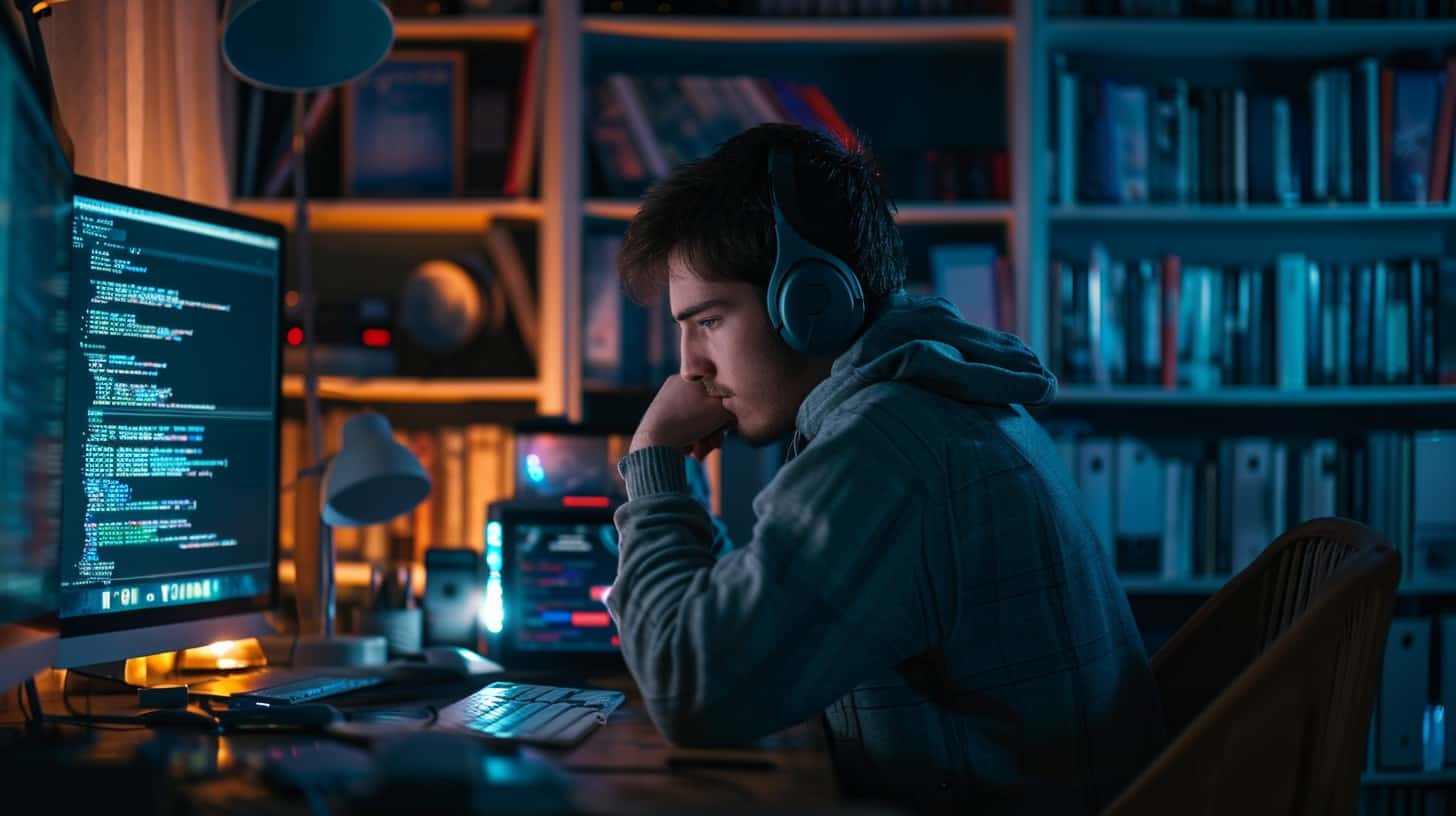
So, let’s dive into the world of sleep science, specifically for us programmers. Our bodies have this built-in clock called the circadian rhythm—it tells us when it’s time to be awake and when to hit the hay.
But here’s the kicker: all those late nights spent tackling code and sipping on energy drinks mess with our body’s natural sleep-wake cycle. It can make us feel like nighttime warriors but at a cost.
Ever felt super sleepy after lunch? That’s because your circadian rhythm dips, causing that midday crash.
Knowing about how sleep works is pretty useful for hacking our productivity as coders. During a good night’s rest, we go through different stages of sleep, from light dozing off to deep ZZZ’s and then dreaming in rapid eye movement (REM) sleep.
Each one plays a role—like REM helps with making memories stick, which is handy when you’re trying to remember that new piece of code. And get this: skipping out on enough shut-eye can lead to rough stuff like high blood pressure or even diabetes down the line.
As we roll into, talking about how folks around us deal with our quirky coding schedules… just remember that while burning the midnight oil might give us quiet time for creating software magic, getting proper rest is non-negotiable for staying sharp and healthy long-term.
For Those Around Programmers
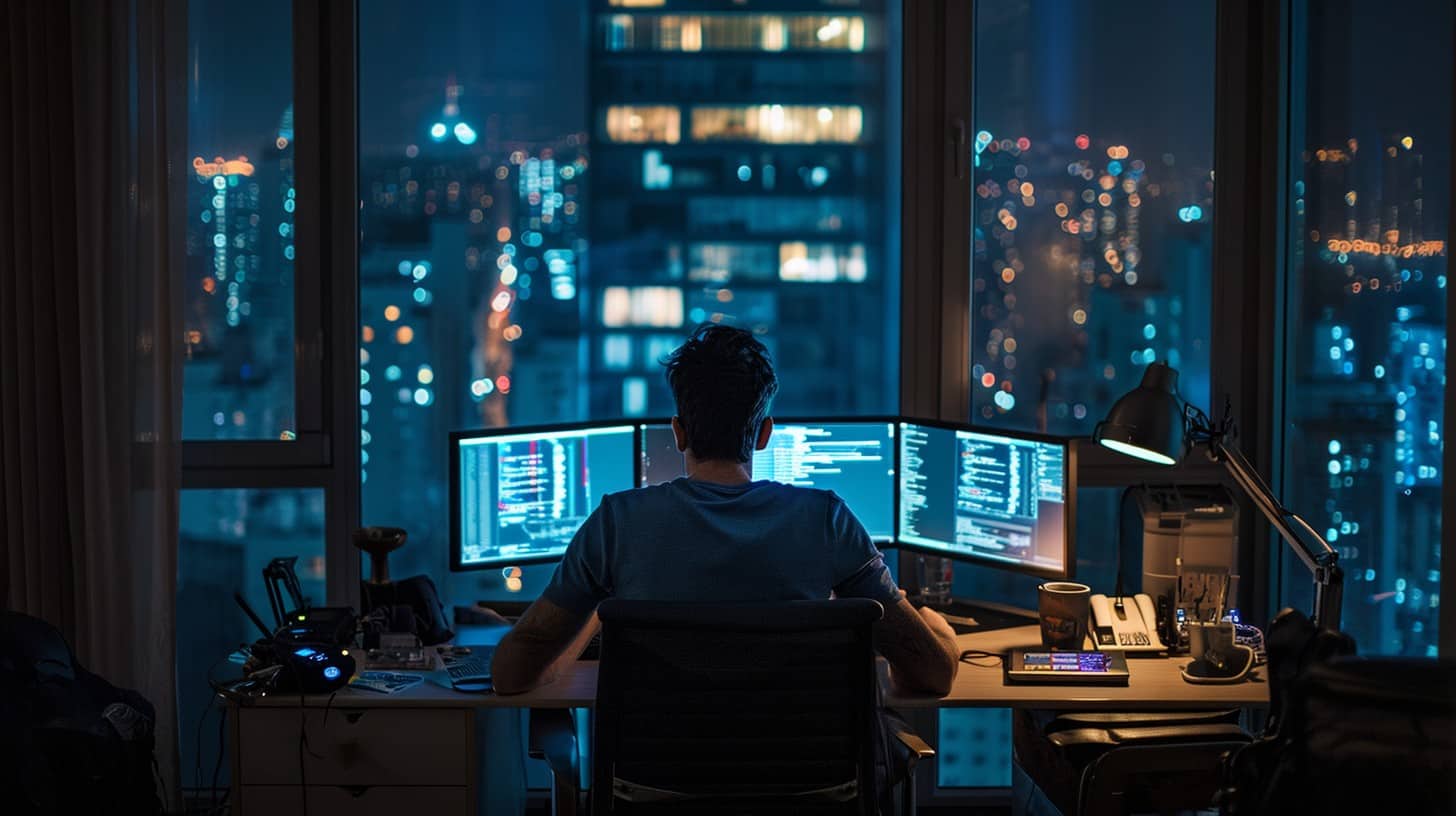
Hey, if you’ve ever wondered about the nocturnal habits of your code-slinging roommate or how to coexist with a partner whose keyboard is their nightlight, stick around—we’re diving into that next, and trust me, it’s not just you who’s curious.
Living with Programmers Who Code at Night
Living with a night owl programmer isn’t always easy. They often turn into coding machines once the sun goes down.
- Understand their peak times: Programmers hit their stride when everything else is quiet. This means they may be more focused and have better ideas during these late hours.
- Expect odd hours: Don’t be surprised if they’re up working after everyone else is asleep. This can mess with regular meal and sleep schedules, but it’s how they get in the zone.
- Quiet is key: Snores and creaky floors are a no-go. They need silence to focus, so tip-toeing around might become part of your nightly routine.
- Bright screens linger: That glow from computer monitors is not just a beacon of productivity; it’s also their constant companion. It might mean sleep masks or blackout curtains for you.
- Solo dinners happen: You might find yourself eating alone sometimes. Programmers often skip meals or eat at strange times when they’re deep into code.
- Patience is golden: Plans can change if they’re really close to solving a problem. Understanding that this isn’t about neglecting you—it’s about passion—is important.
- Appreciate their flow state: When programmers reach ‘flow’, that’s like being in another world—a world of code. Knowing this helps explain why they don’t want to stop until they’re done.
- Encourage breaks: They might forget to take breaks, so gently remind them to stretch or grab some food without breaking their concentration.
- Celebrate small wins: Even tiny breakthroughs matter a lot in programming. Share in the excitement when they fix that bug or compile without errors!
- Plan for time together: Quality time matters, so schedule it when possible. Make sure there’s room for balance between coding sessions and couple activities.
Working with Programmers Who Code at Night
I get it, coding at night has its perks. The world quiets down, and I can think straight without interruptions. Here’s how I handle working with others who also love to burn the midnight oil:
- I make sure we’re all on the same page about when we’ll be online together. It helps us coordinate better.
- Keeping communication clear is key. We use chat apps or email so no one feels alone in the dark—literally!
- Show respect for their prime time. Just because it’s daytime for me doesn’t mean I should call them up when they’re in the zone.
- We set deadlines that fit everyone’s schedules. This way, no one has to switch their whole life around.
- Sharing a virtual workspace keeps us connected. Think shared documents and code repositories.
- Stay patient when waiting for answers. Time zones can cause delays, but we trust that everyone’s doing their best.
- Encouraging short breaks is important too. It boosts energy and keeps our minds sharp.
- Health comes first—I remind my teammates (and myself!) to not skip meals or skimp on sleep.
- Laughing a lot helps us bond. Even if it’s just sending funny memes at 3 AM, it keeps morale high.
Tips for Night-Time Programmers

Hey night owls, you’ve found your rhythm in the quiet hum of late hours, so let’s chat about crafting that perfect nocturnal coding session—no more wrestling with fatigue or the dreaded code fog (trust me, I’ve been there).
Keep scrolling for those insider tips to keep your nighttime groove on point and your code sharp!
Managing Mental Energy
So, we’re talking about managing mental energy, right? That’s like fuel for your brain when you’re coding into the wee hours. Think of it as a battery—I’ve gotta make sure it doesn’t run out before I’m done.
Let’s be real, distractions during the day are like energy vampires. They suck away at your focus juice.
I keep my mental tank topped off by cutting out those pesky daytime interruptions. Yeah, silence is golden! But there’s also this thing called ‘flow.’ Ever caught yourself so into coding that time just flew by? That’s flow; when your mind gets in the zone and bam—you’re on fire!
Now, here’s a trick; ease into programming with a ritual. Some good tunes or clearing my workspace does wonders to get me started. Once I’m settled in – boom – I guard that ‘flow’ fiercely because one little distraction can knock me right off course.
What about you folks who’ve turned night-owl mode on? How do you handle your brain power while burning the midnight oil?
Handling Long Hours
Coding into the night means facing some long hours. To stay sharp, I break things up with quick walks or a bit of stretching. Keeping blood flowing helps me think better and stops me from feeling stiff.
Sometimes, I switch tasks, too—it’s like a mini reset for my brain.
Staying hydrated is another secret weapon. It keeps headaches away and makes sure my mind doesn’t get foggy. We’re not just machines punching out code; our bodies need some love too!
Now let’s talk about setting a routine.
Establishing a Routine
Tackling those long hours, it’s crucial to get into a groove. Having a set routine is like a secret weapon for us night-owl programmers. We carve out late hours where the world quiets down, and that’s when the magic happens—fewer phone rings, less email pings, just pure coding bliss.
Sticking to this nightly ritual helps us dive deep without someone knocking on the door or pinging us online every five minutes.
Now let me share how I lock in my nighttime work mojo: I dim the lights, grab my favorite snack (nothing too heavy though), and put on some tunes that keep my mind sharp but not distracted.
Keeping consistent with these habits night after night makes slipping into ‘the zone’ almost automatic—a critical hack for any programmer who treasures productive solitude under the cover of darkness.
Health Considerations
So, we love the night shift, but hey, let’s not forget to take care of ourselves. Staring at screens till the wee hours? That can mess with our sleep cycles big time. Our bodies need restful sleep just like a car needs oil – neglect it and things start to go haywire.
Ever tried sleeping on a memory foam pillow? It could be a game-changer for better Zs.
A good balance between coding sessions and downtime is super important too. We’re talking quality over quantity here. Long nights might feel productive but skipping out on rest can lead our health on a downhill slide – think attention issues or even drowsiness during meetings (oops!).
So let’s make sure we get those eight hours; power naps count too!
Dealing with Distractions
Okay, let’s talk real for a sec. Distractions are like those pesky bugs that won’t leave you alone when you’re trying to enjoy a night under the stars. They’re super annoying, right? You’ve got your setup—maybe it’s just you and your trusty text editor—and there’s this groove you want to get into but boom! Something pulls you away.
Now, I keep hearing folks saying how they throw on some headphones and dive into their code. That helps drown out the noise for a while—but what about those distractions that sneak up inside your head? Maybe it’s an idea about another project or suddenly remembering you didn’t do laundry (happens to me all the time).
The trick is to write these thoughts down quick and get back in the zone. And hey, if all else fails, find that one spot where internet access doesn’t tempt with social networks and cat videos—the “distraction-free bunker.” Works like magic!
Encouraging Creativity
After we cut out the noise and focus, our brains get ready to play. See, at night, there’s this special kind of quiet that brings out the best in our creative minds. Personal projects light up like fireworks because passion is the spark.
You’re not just coding; you’re painting with code, crafting something new from blank screens and ideas.
We all want that “aha!” moment where everything clicks. Alone with our keyboards, solutions pop up like magic. Nighttime isn’t just for dreams—it’s prime time for making cool stuff happen.
And really, isn’t creating what it’s all about?
Maintaining Relationships
Okay, let’s talk real for a second. Staying up all night coding can mess with more than just your sleep schedule—it can shake up your whole social life. I get it; when you’re deep in the code zone, time flies, and before you know it, it’s 3 AM.
Your friends? They were asleep hours ago. And if this happens too much, keeping up those relationships gets tough.
But we’re not islands, right? Humans need other folks around—yes, even us programmers who love nothing more than a quiet room and an open IDE at midnight. So we’ve got to make that extra effort to connect during “normal” hours sometimes.
Maybe grab lunch with a pal or hit that family birthday party, even if you’d rather be debugging something till dawn. It’s about finding balance, so our closest ones don’t feel left out in the cold.
Alright then – enough of that; next up is how my fellow night-owl coders might keep their brains sharp and health on point while living this nocturnal lifestyle.
Are Developers More Productive at Night? An Analysis
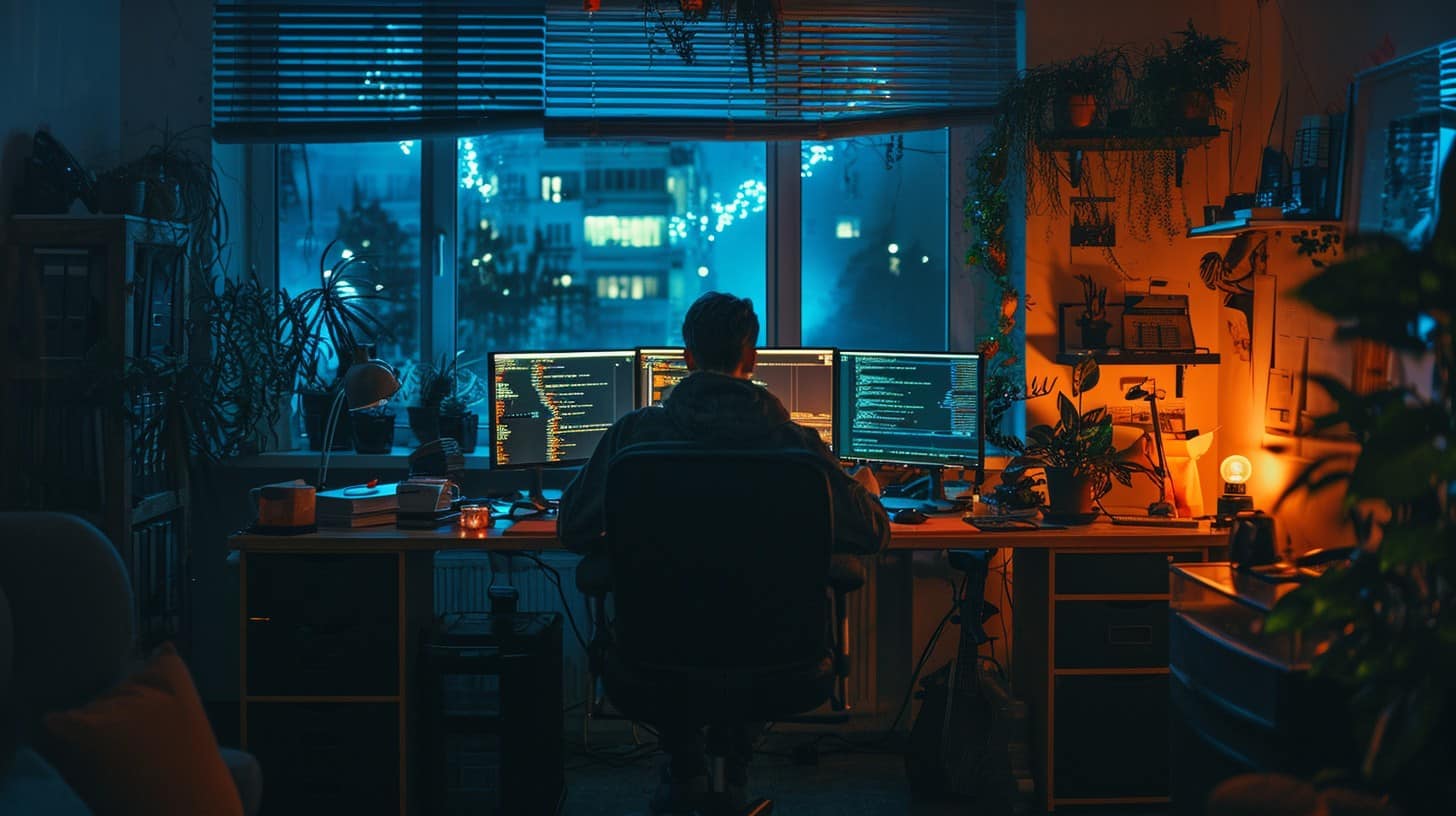
So you’re wondering, do I code better when the moon is up? Well, it’s not just you. Many developers swear they hit their stride after dark. It makes sense in a way—our days are full of emails, meetings, and interruptions that can make it tough to focus on deep work like coding.
At night, those distractions fade away. The world gets quiet; it’s just you and your screen.
Here’s what some science says: our brains have this thing called circadian rhythms—a fancy term for our internal clock that tells us when to feel sleepy or alert. For lots of folks around 21 years old, this rhythm shifts toward being more awake at night.
Plus, when we’re tired, we often try harder to concentrate, which can actually lead us to come up with some pretty cool stuff! Now let’s talk about those who live with programmers working at odd hours.
The Magic of Moonlight Coding
Well, there you have it. We code at night for the quiet, the focus, and yeah, maybe because our brains just come alive when most folks are sleeping. It’s a dance with keyboards under the moonlight—just me and my glowing screen until the early hours.
Sure beats a morning alarm clock!
FAQs About Why Developers Code at Night
Is it true that coders like to work at night?
You bet! Many developers hit their stride when the sun goes down. They find the quiet of nighttime perfect for focusing, plus there aren’t as many people around to bug them with questions or meetings.
Will coding at night mess up my sleep?
Coding into the wee hours can lead to less zzz’s, yup – that could mean battling some serious sleepiness during daylight hours. It’s a tricky balance; you don’t want your brain thinking it’s party time when you’re trying to catch some shuteye!
Do devs drink lots of coffee to stay awake?
Oh boy, do they ever! That caffeine high keeps them buzzing and cranking out lines of code way past bedtime. But hey, remember not too much – nobody wants those jittery hands typing away!
Could staying up late be bad for my health?
There’s talk that all-nighters might lead to health hiccups down the road—things like heart stuff or even messing with how sharp our brains are… Gotta watch out for that!
Why do some programmers think better in the dark?
It seems like their brains just “get” complex problems more easily in the quiet darkness of night without all those daytime distractions… It’s like suddenly everything just clicks (or should I say codes) into place.
What if I’m not a night owl, but still want to code after dark?
No prob! You don’t have to be naturally nocturnal – sometimes it takes practice getting used to working later than normal, so give yourself time and maybe sneak in an afternoon nap here and there if you can.


